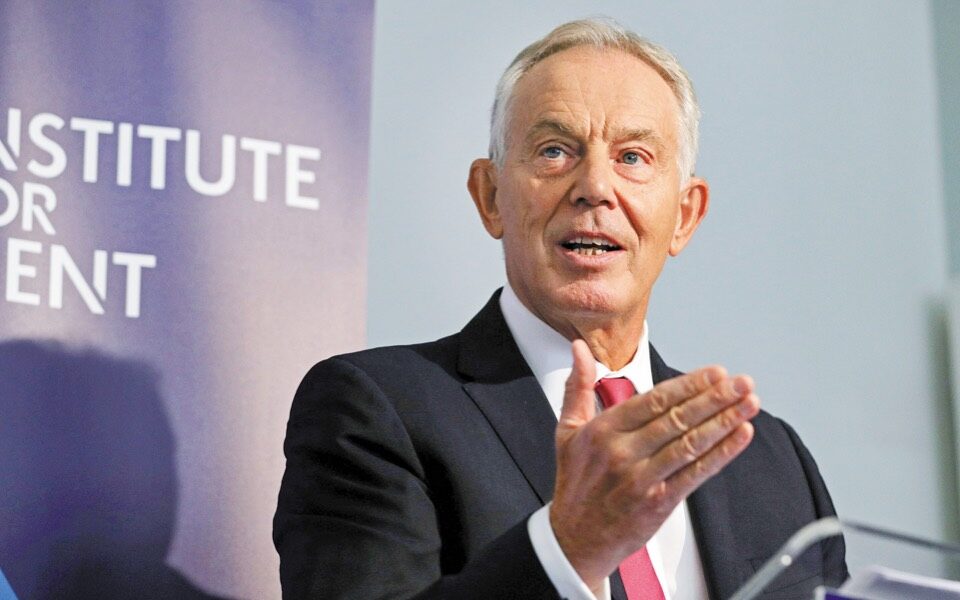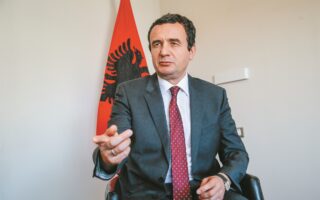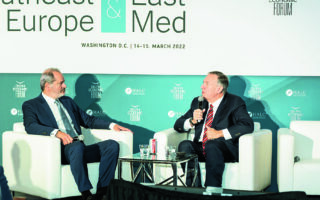Ukraine will emerge with EU prospects, ex-UK PM tells Kathimerini

A conversation with Tony Blair never fails to be fascinating, as he is one of the few veterans of Western politics who is still a global “player” thanks to his solid opinions and active engagement.
Speaking to Kathimerini at the recent Delphi Economic Forum, Blair spoke about his impressions of Vladimir Putin the first time they met and how the Russian president has changed since then. He also presented his assessment of the ongoing war in Ukraine, and the new cold war that seems to be looming on the horizon.
The former British prime minister expanded on the question of whether democracy is under threat and capitalism needs to correct the great inequalities and distortions that have emerged, giving answers that demonstrate why he is regarded as one of the most open and vibrant minds of this era.
You were probably the first Western leader to meet Vladimir Putin some time ago. Could you recall your first impressions and how would you say he has changed?
I knew Putin in what I would call two incarnations. And the anxiety that I have now, is that we’re witnessing a third. The first was the leader I met just before he took office. He insisted the meeting was in Saint Petersburg. So it was very Western facing. He was focused on reform of the Russian economy. He wanted good relations with the West. And indeed, contrary to some of the things he said recently, we tried to bring those about. Remember the G7 was the G8, during my time. And we tried to bring Russia into the dialogue with NATO indeed. That was the first incarnation.
The second was towards the end of my time in office, when he had started to remove the checks and balances within Russian democracy and obviously had surrounded himself with a group of people who were at very tight control. So he had become a much more dictatorial figure. But though he was quite brutal, he was also calculating.
The third incarnation. What makes me anxious is that there is a third incarnation, and I can’t imagine the Putin of that earlier time making such a gross miscalculation as this. To miscalculate in this way means that you’ve surrounded yourself with a small group of people who will not tell you anything you don’t want to hear. And one of the most important attributes of leadership is that you understand you’ve got to have a team around you that’s prepared to challenge, and that’s prepared to question, and with whom you can have a proper debate. But what has happened is that, clearly, that is not the case. And believing you would go into Ukraine, and the Ukrainians would not fight to defend their territories is an extraordinary misjudgment. [The Tony Blair Institute for Global Change] has a project in Ukraine, so I’ve been there virtually every year since leaving office. Anybody who goes and meets the younger generation of Ukrainians or the younger ministers in the Ukrainian government would know that they were going to fight. There was never any way that they were going to concede it this way. So those were the experiences I had when I was in office, and that’s my worry.
If you go back and you revisit that whole period, do you think there was anything the West could have done better in terms of dealing with Putin? Either bringing him closer to Europe or perhaps being tougher towards him?
I think about that a lot, and you’ve got to think about this question self-critically. We didn’t fully appreciate how detached he was becoming from the West, how hostile he was becoming. I used to have this conversation with him and I said: “Look, you think that we want to surround you in some hostile way. Basically, the West’s attitude to Russia is let’s all get on. We got other things to do. We got economies to sort out. We got problems in our healthcare systems, our education. We want to get on with all that. And we’re also fighting against terrorism.” So, I think it is important to say that this idea that the West was, in some way, intrinsically hostile or starting from a position of hostility, well, when I was there, that was definitely not the case. On the contrary. There was huge frustration that we couldn’t get into a proper working relationship. That’s why, in recent years, I’ve always said to people when they ask me about Russia that, although I can give you a very clear analysis of virtually any country on the planet, when it comes to Russia, I never know whether to be worried or very worried. And today obviously, I’m very worried. But I still can’t entirely figure it out even now. But anyway, what’s happened is a terrible thing and a terrible tragedy. But what will come out of this, I think, is that long-term Putin’s position will be weakened, possibly fatally. And long term, I have absolutely no doubt at all, Ukraine will emerge as a strong independent country, with a likely path to Europe.
So you think a palace coup is possible within the Kremlin?
I don’t know. You’d have to you have to consult the Oracle here. I’ve literally no idea. By the way, there are very few people, and I’m not one of them, with the expertise to judge that inner circle and what might happen. Though what is very clear to me, is that there may be a minority of Russians, but that minority that has access to the outside world, that is connected on the internet, they will be shocked and appalled at this. And the Russians that I do know, outside of Russia, are devastated by it, because this will, over time, cripple the Russian economy and make the country in a pariah state for the time that Putin is there. So what benefit there is for Russia? This I really can’t see either.
One unexpected outcome of all this is the US coming closer to Europe. Do you think this is momentary? It’s going to be lasting for a while? Do you see a joint defense effort?
I think it is a big moment. And a pivotal moment. And so my answer would be yes, most likely, because I think America is going to see this in the context, not just of Russia, but of China, of the way the world’s developing and will realize that that transatlantic Alliance that was born out of different times and different circumstances, has renewed relevance today. I do think that. And I think President Biden has actually done really well in pulling the West together. But I think it’s also going to revive Europe in a big way too, because one of the things that will emerge from this, is that democracies will rediscover a belief in their own system. And I think that’s important, and I can see that happening.
I want to go further into this “democracy under challenge” threat. But I want to ask you what happens if Trump is re-elected or another Trump-like leader is elected the US? Because that’s possible. And as you know Trump was a big wake-up call for Europe, people got really scared here.
I study American politics a lot. I think, irrespective of who is leader, there is going to be a public opinion push in the US, to make sure that the US and Europe are together. I think whoever is president is going to have to take account of that. And it’s worth pointing out that even in Trump’s time, actually, there was a significant increased American presence in Eastern Europe. So who knows? And I think, in the end, in a democracy, you’ve got to work with whoever the people of the country elect, but I think this is, I hesitate to say permanent, but I think for the foreseeable future, America and whoever is president will understand the importance of this alliance.
How worried are you about the forces of populism? They seem to be alive. Stagflation, the rise of prices, of course doesn’t help. Social media doesn’t help. Are you worried about that?
Yes, I’m worried about it. It is important to define what populism is. Because you can’t define populism as being popular. Most politicians want to be popular, right? That’s not a political crime. I define populism, as taking the grievance and exploiting it rather than dealing with it. That to me is the essence of populism. In other words, if you take a genuine problem, let’s say immigration, their desire is to whip up adverse feeling against immigrants, their desire is to use it as a means of rallying support to divide a country. Whereas, I think, the right politics is to deal with the grievance and to try and make sure you have a solution. So, you provide the answer rather than riding the anger. That, I think is the difference. That populism is there in Europe. It’s been there in the UK. I always, from the progressive side of politics, though, look at this also self-critically. It’s almost always the right-wing populism that triumphs, the left has its own populism – we have the Labor Party under a populist leader in the UK, after Jeremy Corbyn. But, if there’s populism of the right versus populism of the left, certainly in our system, the right always wins. But that populism of the right, it gains strength if the left is also pursuing its own version. I read an interesting book a short time ago called “1931,” which is really more about the debt crisis in Germany before WWII. But what was really interesting to me is that almost unintentionally the book brought out the degree to which the rise of the Nazis was fueled by some of the activities on the far left, with the middle ground being squeezed. I still hold to the view very strongly that the middle ground in politics is the right place to be, center left, center right. Because, the irony for Western politics is that the 21st century solutions are essentially practical, but the 21st century in recent times has borrowed a lot of ideologies from the 20th century and it’s nearly always destructive.
But social media makes this debate very difficult, because the center, common sense, is very difficult to defend against the extremes. How do you deal with that?
Twitter wasn’t around when I was prime minister, and I never had a mobile phone. I now look back and think heaven knows what nonsense would have been on it. So, social media. You’ve got to have the strength as a leader to understand what it is and what it isn’t. It’s basically an outpouring of emotion. But, one of the first lessons you learn in politics is that those that shout the loudest don’t deserve to be heard the most. It’s a very important political lesson. So these people who say these things… I couldn’t go on Twitter and write some of the things that people write. Maybe it’s sort of British reserve that says, “No, that’s too rude.” But these people do it, but you’ve got to be, as a political leader, careful you don’t misunderstand that for the whole of public opinion. And there’s an irony about social media, which is it pushes politicians and knocks them off balance. But what they should always understand is the public isn’t stupid, and they realize that it’s important to have leadership. And so, in a way, the politicians they respect – by the way, I think this is part of Trump’s appeal in America – the politicians they like are the politicians that don’t just go with every wave of opinion. But, to a degree at least, they are rock against which those waves crash, but they don’t shift it. So people still want leadership. So, social media, in many ways, it’s a plague in modern politics, but it’s a fact and you’ve got to be strong enough just to withstand it. The best prescription for a politician is just don’t read it.
One of the problems is that they used to be pillars of authority. I mean people in the UK or the US would watch the same networks, read the same papers and so on. This is not the case anymore. So how do you reach out to all those people who feel like they’re left behind or that the globalization train is too fast for them? How do you talk to them?
It’s a really interesting point. We don’t live in an age of deference anymore. You know, when Attlee was the prime minister of the UK in 1945 and post-war Britain, if you see some of the interviews with Attlee, the interviewers – I mean, you’ve been perfectly polite Alex, but nowadays, you know, interviews can be quite rough, and that’s not an encouragement by the way – but the interviewers with Attlee were basically “Tell us what you would like to say Prime Minister,” and then, at the end of it, “Thank you very much. Anything else you’d like to add? OK fine.” So that was then. Now, there’s no deference. But this is why the quality of the debate politicians have got to have with their people also needs to change, because it is important sometimes to challenge people, and not simply to try and work out where they are and follow them. Politics is a strange business today, in that the quality of that debate with the public, in the West, it has not matured in the way it needs to, to protect democracy. Because, I always say to people, in any other walk of life other than politics, if someone spent their lifetime studying something, you’d pay attention to it, right? Someone spent their life studying brain surgery. You would say, “Yeah, they’re going to know more about that than me.” Even if someone has been a football coach for 30 years, no owner of a football club would say: “Right, we’ve got a new manager to appoint. Where’s the most enthusiastic fan? Step forward, you run the club.” They’d take that as ridiculous. Politics, “So what if you studied that all your life? I know better than you!” I mean when you think with the Brexit in the UK and you had every former prime minister, everyone, very different people, all saying, “Please don’t do this, it’s a mistake,” and people go, “Yeah, what do you know?”
It works the opposite way. We had the same experience, we know.
What it means though for democracy, is, if you want to protect it, you’ve got to engage the public in a much more structured debate. And you’ve got to be prepared to say, “Look, if you want leadership” – I always say this to people – “trust the leader who’s telling you what you don’t want to hear, because unless they’re an idiot, they know what you want to hear, and they’ve decided not to tell you it, so maybe that’s for a reason. Maybe that’s because they believe in what they’re doing.” Whereas, the person who comes along like many of the populists do, left and right, and says to you: “I’ve got a simple solution for this thing. You just leave it to me.” Those elites, they’re the ones that have misled you. Those are the people you should mistrust. Because the problems of today’s world are complicated and they do need people who study them and they do need analysis and they need evidence-based policy, not the first thought that comes in someone’s head in order to please you.
Could Churchill have survived today’s environment?
Well, all depends on the circumstances, I think.
I mean people would say he’s an alcoholic and I don’t know what else they would say, right?
Yet, Churchill and Twitter is interesting. I think he could have been quite creative, actually.
He would be the answer to Trump actually, right?
You just can’t tell because it’s a different era altogether. It is a problem today when democracy is only as strong as the quality of the people that are running it, and the other thing is I think we’ve got to be very honest about the challenge of democracy today. The challenge is efficacy, right? It’s “can you get things done?” In a fast-changing world, you need to make change, but it’s very difficult to do. Every time you try and reform or make changes, it’s hard to do. And therefore the problem that you have in democracy is how you make it efficient, and how you keep it consistent over a period of time. I mean, I used to be criticized for this, but I always thought it was a benefit for the country in a way. Margaret Thatcher made a lot of reforms in the UK, in the private sector. Top rates of tax, privatization of some of the state industries, different environment for labor legislation, and so on. And when I came in, I very deliberately left the essential pillars of that in place, but I regarded my job as rebuilding the public realm. The truth is that the health services, failing education, wasn’t doing well enough, and big problems in law and order and so on. Now that gave the country pretty consistent policy for roughly 30 years, and that’s a benefit. And part of the trouble with democracy and has been a particular problem in the US, is this kind of from side to side, and then inside the country it’s hard to get long-term planning, and external allies get confused.
Are we at a time when we have to redesign global order, address some of the grievances that have led to populism? You were instrumental in the third way. Is it time now for a fourth way? And what would it look like?
I still think it’s basically the same choices and it all depends how you analyze the world today. So for example for me the biggest real world event – I mean, leave aside the issues around Ukraine and so on – but the biggest real world events over the next years in terms of real life, is the technology revolution. That’s the single most important thing that’s going on. It’s going to transform the private sector, the public sector. It should transform your healthcare system, your education system, everything. So the challenge for politics is how do you harness that revolution and use it constructively, and make sure that it reduces divisions in society, doesn’t create new ones. That is, to me, an issue that depends on understanding, getting the right policy, having the right ambitions. It doesn’t really depend on an arcane 20th century debate between “Is it the state or is it the market?” So, call it whatever you like, but I still believe that, provided the center ground is a place for radical policy making, and not simply for finding the lowest common denominator between left and right, then, I think that’s still the best place to be. But, I think we will get a significant resurgence of support for democracy out of what is happening.
But there’s a lot of discussion among people: Can democracy deliver the goods for me? Is the system in Dubai or Singapore better than Western democracy?
That’s why I say the challenge is efficacy. If you read a lot of the public debate about democracy and, a lot of debate in parts of the media, it’s all about “Are you accountable? Are you transparent?” But really, the problem for people is that democracy doesn’t deliver and, you know, my institute works a lot in in Africa and I see countries struggling with democratic systems. Of course, it’s right that they have them. Whereas those countries are able to pursue a consistent policy over a period of time. You know, long-term strategy is difficult and that’s why it’s essential that Western politics returns to what I will call a more center ground. Because if it doesn’t, and you end up as you have in the United States, where sometimes it looks like you’ve got two groups of people who are really, in a way, in a cultural war with each other, who don’t listen to each other or particularly like each other. If you’re not careful, you get into a situation where you demonize your opposition and then you, in a way, undercut their legitimacy, and that’s very dangerous. So we’ve got a lot of work to do on democracy, but let’s be very clear: If Russia were a proper democracy, Ukraine wouldn’t be happening.
Are you worried about France?
Well, I’m British. No, we love each other really.
Deep down.
Deep down. Personally, I think President Macron has done a good job for France. He’s made economic changes. We need France to be strong and sensible. These elections are always tough. And there are obviously major problems that need to be grasped, as there are in all countries. But it’s up to the French people to decide, but, personally, I think he has shown a lot of courage in developing an alternative for the French.
What would a Le Pen victory mean for Europe and the West?
Well, again, I’m always cautious about this just before a country’s about to make their electoral choice, because they don’t need people from the outside telling them what to do. But, you can go and look at the policy, read it, it would obviously be a major change and challenge.
One thing that has really struck me is, back in the days when you had the Iraq Coalition, you had the huge majority of countries and nations working with you. Now, when I look at the Ukraine situation, it’s only the industrialized West, basically, which is following the line towards Russia. And also you have things like the Saudis not responding to calls by President Biden. This is a new thing. Is this worrying you? Is this a decline of the West and its influence?
Well, I think again, it’s a wake-up call to the West. I think that we’ve got to understand that if we want to protect our way of life and protect our values, we’ve got to get out there with a strategy. The thing that’s been absent from the West, in my view, is what I call strategy. That is, long-term thinking, where you say, “How do I build support for our values and protect our interests?” Because the two are linked. So if you look at the Middle East, for example, there is a reason why these countries have been hesitant. Because they see a huge problem with Iran, and they think the West is more anxious to do a nuclear deal with Iran than protect their interests. If you’re in Saudi or in the UAE, you’ve had missiles fired by the Houthis at your civilian population, so, you’re going to worry about that. If you were India, roughly half of their defense sales are from Russia. So my view is, part of what the West has got to do is not just describe its values, it’s also got to stand up for its interest properly. If you take Africa, again, China’s all over Africa. Russia is also active in Africa today. Now, it’s perfectly simple, the reason for that. If you’re an African president and you want a road built between A and B, which is vital for your infrastructure, you talk to the West about it. Two years later, you’re still locked up in some committees somewhere, debating it. You say that to China? They say, fine. Next day, someone’s there with a shovel digging. That’s the difference. So, this is why I say the West has got to get itself in order. Long-term strategy. Look at what’s happening in the Sahel at the moment, where those countries are at risk of collapse. We left it to France and they can’t do it all on their own. And they’ve now essentially taken their forces back. We’re crazy if we don’t understand we’ve got a long-term clear interest in protecting ourselves against what will otherwise be a wave of migration and extremism. So my point about the West is it has got to recognize what the problems of democracy are, around efficacy, resolve them. It has got to realize it’s in a new world today, and China particularly changes the whole geopolitics of the world. And it’s got to have a long-term strategy that builds strength, and does that in an absolutely clear-headed way and doesn’t try and operate as if government was an NGO. Because it’s not.
Since you challenged me, and I know you’ve been asked this a million times. The Iraq War. Do you think you and Western leadership squandered valuable capital back then for no reason?
When people look at 9/11 and post-9/11, it’s easy to look at it with the thought of today. But back then we really believed we were in a completely new world and had to take very strong action. And, both in respect of Iraq and Afghanistan, you could completely disagree with the original decision to go into either. But once there, and once having secured a position there, in my view, we should have held to it. And so, both in Iraq, but also, most noticeably in Afghanistan, we could have stayed the course, and helped that country over a long period of time, and I believe it would be in our interest to do so. And here’s the problem, if you contrast that with what Putin did in Syria. So he intervened not to give people a democratic choice, but to suppress democracy and support the dictator. He held his position over 11 years, irrespective of the commitment and the cost of that commitment. And he’s now the most powerful player in Syrian politics today. So, sure, of course, there will carry on being a big debate about Iraq, about Afghanistan, about post-9/11, what did we do. But my point is very simple. In the end, if the West wants to be strong, it’s got to have staying power. And that means even as I say, if you disagree with the original decisions, once you’re there, and you’ve done the hard part, stay to make sure that you’re able then to help those countries, but also to keep your own position strong.
If you knew back then what you know now, would you have made the same decision?
It’s an impossible question ever to answer because you’d have to take the decision on the basis of the information you have. But I’ve always said to people, I believe that the world is better without Saddam. I know people will say, “Well, but don’t you look at all the trouble Iraq went through after that?” But some of the best evidence you get on this is from Iraqis. I mean, I know the Iraqi leadership today and it’s worth just posing them that question too, because I think you’d get a surprising answer.
Here’s my last question, which I cannot resist. What’s wrong with the British establishment? Why is that they cannot produce good prime ministers? Is it an intern problem or is a structure problem?
When do you think they stopped doing that? All I do know is this. The one thing I’ve learned about life after politics, is it’s a lot easier giving the advice than doing the job. So I approach this with a certain degree of humility as it’s probably every generation thinks the next generation is not good enough. But I’ll just leave you with this one thought. I think British politics, having been through a very difficult period, I think there is now more of a common ground and the Labor Party, let’s say, is in much better shape than it has been. And I honestly believe, even though I passionately disagreed with Brexit, Britain remains a strong country. Our best days can lie ahead of us. If we have the right leadership and the right plan for the future, we’re still going to be a key player and a good and strong ally, not least for Greece.





